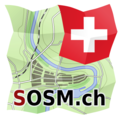Version 1
Talk (30 min): How to mine the planet
About accessing and visualizing OpenStreetMap open data and more

Join online: viscon.ethz.ch/livestream
In this talk we'll learn the various ways on how to retrieve and visualize Points-of-Interest (POI) from OpenStreetMap (OSM), such as restaurants, schools - or table tennis tables. We show typical use cases of geovisualization using Python in Jupyter Notebooks and JavaScript for interactive web maps. We also disclose the "magic 3 steps" of Location Analytics which combines geonames or address data with foreign open data.
We at Geometa Lab are often being asked at hackathons or by startups: How can one access OpenStreetMap data for data analysis? And how can geospatial data (short geodata), specifically Points-of-Interest (POI) be visualised using Python/Jupyter Notebooks or JavaScript/webapps? OpenStreetMap (OSM) is the largest citizen science project about vector data of planet earth which we're using here at Geometa Lab as a gold mine in mobility, tourism, planning and spatial data analytics in general.
So we first show some open source libraries we're using to access OSM data, like OSMnx for Python and query-overpass for JavaScript, which both use the cryptic Overpass service. And we show some libraries to visualize geodata as interactive thematic web maps, like matplotlib (or Plotly) for Python and Mapbox GL JS for JavaScript.
Then, we also disclose the "magic 3 steps" of location analytics which combines own data with foreign open data. One can do this since location is "the universal foreign key": Given geonames or address data, step one is to geocode it (i.e. adding a coordinate attribute), then step two is to spatially join (i.e. combining) it with 3rd party geodata, then finally (step 3) is doing the data analysis or geovisualization.
And since we're talking about data mining the planet, we're using OSM for most of the examples as 3rd party geodata. But there's more open data around which will be conclusion where we give tipps on how to discover more open geodata.
Info
Day:
2020-10-10
Start time:
14:00
Duration:
00:40
Room:
Online / ETH (RED)
Track:
Interdisciplinary
Links:
Concurrent Events
Speakers
| Stefan Keller |